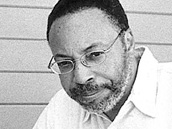Poetry and Sundry Reviews
George Elliott Clarke
Yusuf and the Lotus Flower
by Doyali Farah Islam
Buschek, 2011
$18
The Secret Signature of Things
by Eve Joseph
London, ON: Brick, 2010
96 pp. $19
Yusuf and the Lotus Flower enacts a fine debut for Doyali Farah Islam, beginning with the nice cover illustration and ending in verses that skirt despair to encounter rapture. Her poems are religious, but her expressions of reverence never sound rhetorical.
Islam’s Islam is open to Judeo-Christian thought as well as Hindu, Jain, Sikh, Buddhist, and yogic orientations. Her orthodoxy is, well, heterodoxy.
Her poetry fuses Emily Dickinson (1830-86) and Allen Ginsberg (1926-97). There’s ecstasy in finding the divine, but there’s a lot of “shit†(her term) on earth – in the messiness of relationships as well as in the squalor of socio-economic inequality.
Born to Bangladeshi parents, Islam has been educated in London, UK, and in Toronto, where she grew up, and where she was, I confess, a student of mine in 2010-2011. (Lest I be accused of favouritism, I’ll point out that Islam won Contemporary Verse 2’s 35th Anniversary Contest).
The poems are meditations, and may be classed as part-Beat and part-Metaphysical. But there is also undeniable romanticism: “I have fallen through something, / gouged a hole in a stable dam, / punctured murals of pastel skies and / watercolour’d sea.†If the latter images are a tad florid, the poem opens with powerful simplicity: “thrust, / a tiny key / into rusted heart-lock. // dig and twist.â€
These lyrics are about seeking the peace (even a piece) of the Divine: “once more, you too may return / with clarity to perfume the very core / of the seed within your soul, / the essence of which … / makes your face an open blossom—awesome, / unfolded lotus gleaming the sombre night, / come through the mud, come through the shit, / ever intoxicating and haunting in beauty.â€
The challenge in drafting ethereal lyrics is, of course, to make them seem more real than ether. Islam succeeds most when she connects her spirituality to what is tactile, visible, sensuous: “I stand in earthiness recollecting / autumn in a Canadian wood: / burning, burning—alive in the burning; / churning, my heart particles saw / destruction and creation unfold; / garnet, fire, opal, amber, gold, / steel to copper to silver to gold.†Yes, to see heaven most clearly, it helps to be looking up from dirt: “weight of mud on flesh and blood: / I was a pig hampered by sludge, never lifting / my head or eyes; gleaning trough-feed and scraps; for years, fattening myself up / for another cowardly death.â€
Indeed, “no jewel shines with mud caked on; / no spirit lamp guides with mud caked on.â€Â One hears here an echo of the post-World-War-II imprisoned, chastened, Yank bard Ezra Pound (1885-1972). His Pisan Cantos (1948) also acknowledge that one must pass through hell-on-earth to achieve any kind of heavenly peace. Islam is a poet of capacious heart and sagacious mind. She has started well. To go further, as she will, she must hone her verse, so that each line, each image, each stanza, contributes inexorably to the spiritual revelation that she wishes to announce.
Eve Joseph’s The Secret Signature of Things is her sophomore collection. Raised in North Vancouver, she has travelled widely, but now lives in Victoria, B.C. Though their joint appearance here is coincidental, Joseph pairs well with Islam, for she is also interested in the notion of epiphany – of sudden, startling revelation. Joseph’s poem for the martyred Russian poet Anna Akhmatova (1889-1966) is a case in point: “In one translation of Akhmatova / a few early snowflakes blow in the wind / ‘barely, barely’ // In another— / same wind, same early flakes—only / ‘lightly, lightly.’†Joseph concludes, “It matters that … / lips that barely brushed hers / were not the ones she lightly kissed.†Joseph’s eye sees the numinous in all: “the seats of the train station // are worn and polished like pews / and the streets occupied / with the commerce of old acquaintance.â€
In a prose poem, she declares, “I want to ask poetry where it was for all those years … when I traded my Penguin classics for True Crime stories?†Finally, she wants to know “where the birds went when they disappeared and how it was they reappeared in cursive loops like a new language above the daffodil fields one afternoon in late March.†Well, amen.





No Comments so far ↓
There are no comments yet...Kick things off by filling out the form below.